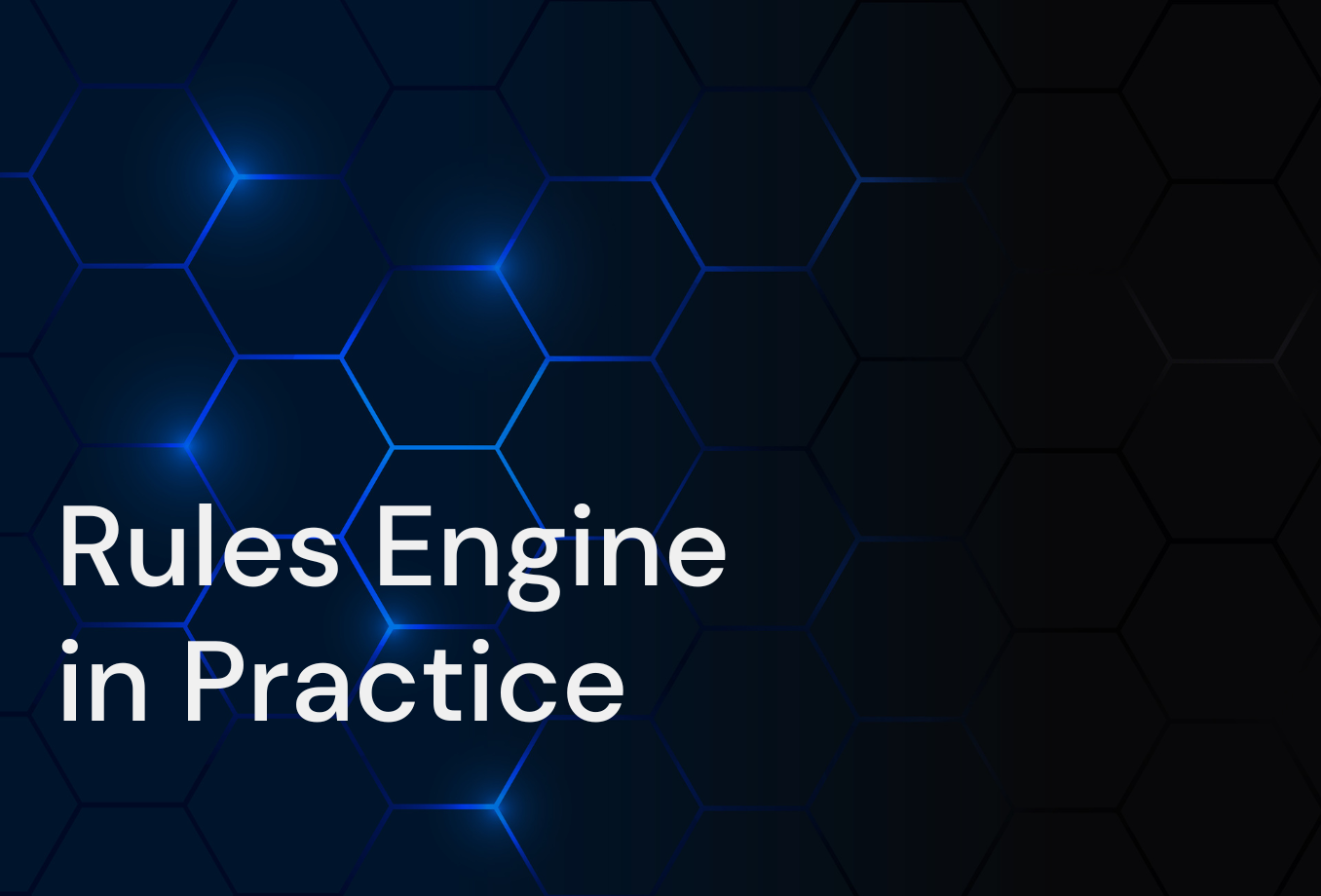Every business needs to adhere to regulatory rules. Some of them exist to protect the customer, employees, or the environment. Some exist just to keep office employees and politicians busy. Nonetheless, ignoring them can cost a lot of money, and hinder company's growth, or even ruin it.
The best way to adhere to rules is to use a business rules engine. Seamless processes, non-biased decisions, consistency across the whole organization, all of this while being accessible to non-technical, business users.
How compliance looks across different industries? How to implement business rules engine to smoothen the process? You'll know after reading this article.
Regulatory Compliance Across Industries
Healthcare
The healthcare industry is highly regulated to ensure patient safety and data privacy. Some key regulations are:
- HIPAA (Health Insurance Portability and Accountability Act): Patient data privacy and security.
- FDA regulations: Medical devices and pharmaceuticals development, manufacturing and marketing.
- Basel III: International banking regulations, capital adequacy and risk management.
- Dodd-Frank Act: US financial reform law, covers various aspects of the financial system.
Energy and Utilities
This sector has regulations around environmental and infrastructure security:
- NERC-CIP (North American Electric Reliability Corporation Critical Infrastructure Protection): Power grid security against cyber and physical threats.
Technology
Tech companies have regulations around data protection and privacy:
- GDPR (General Data Protection Regulation): EU data protection and privacy law.
- PCI DSS (Payment Card Industry Data Security Standard): Security standards for organizations that handle credit card information.
Regulations Get More Complex
The regulatory landscape is getting more complex due to:
- New technologies like AI and blockchain and regulators are trying to catch up.
- Companies operating across borders have to comply with multiple, sometimes conflicting, regulations.
- After high profile data breaches, regulations like GDPR have set new data protection standards.
- Growing awareness of climate change has led to more stringent environmental regulations across industries.
Non-Compliance Consequences
The stakes for non-compliance have never been higher. Organizations will face severe consequences for not meeting regulations:
- Financial penalties: Fines can be huge. For example, GDPR violations can cost up to €20 million or 4% of global annual turnover, whichever is higher.
- Reputation damage: Non-compliance can lead to negative publicity, customer trust and brand erosion.
- Legal consequences: In extreme cases, non-compliance can lead to criminal charges against company executives.
- Operational disruption: Regulatory bodies can impose restrictions on business or revoke licenses for serious violations.
As of 2020, the average cost of non-compliance for organizations was $14.82 million, 45% increase since 2011. This includes regulatory fines, business disruption, productivity losses and reputation damage.
Why Regulatory Compliance Matters
Regulatory compliance is a business strategy that can make or break an organization. Handling compliance smoothly and accurately can enhance operational efficiency.
Protecting Consumers and Stakeholders
One of the main purpose of regulatory compliance is to protect consumers and stakeholders from harm or exploitation.
- Financial regulations like Dodd-Frank Act prevent predatory lending and protect consumers from unfair financial products.
- In healthcare, HIPAA protects patient data and medical information.
- Environmental regulations protect communities from pollution and health hazards caused by industrial activities.
According to a study by Consumer Financial Protection Bureau, stronger consumer protection regulations have saved American consumers over $12 billion since 2011.
Business Integrity
Compliance helps maintain business processes and creates an ethical culture within organizations.
- Anti-corruption laws like Foreign Corrupt Practices Act (FCPA) promote fair business practices and prevent bribery in international business.
- Corporate governance regulations ensure transparency in financial reporting and accountability of company leadership.
A 2020 study by Ethisphere found that companies with strong ethical practices outperformed others by 13.5% over a 5 year period, proof that compliance, integrity and financial performance are linked.
Competitive Advantage
While seen as a burden, effective compliance can be a competitive advantage:
- Companies with strong compliance programs are viewed more positively by investors and partners.
- Compliance can drive innovation by forcing companies to develop new products or services that meet regulatory standards.
- In some industries, compliance certifications can open up new markets.
A PwC research found 58% of CEOs see industry specific regulations top of mind followed by compliance rules for data privacy and cybersecurity, labor and workplace safety, environment and climate change legislation, and tax compliance.
Trust with Customers and Investors
Compliance is key to building and sustaining trust with customers and investors:
- Data protection regulations like GDPR shows a company is serious about customer data, customer trust.
- Financial compliance means accurate reporting which is critical for investor confidence.
- Environmental compliance can boost a company’s reputation among eco-conscious consumers.
According to 2020 Edelman Trust Barometer, 74% of consumers say a company’s impact on society is a key factor in their purchasing decisions, proof that regulatory compliance is key to public trust.
Risk Management and Long term Sustainability
Compliance helps organizations identify and mitigate risks, for long term sustainability:
- Regulatory requirements demand regular risk assessment, helps companies to proactively address potential issues.
- Compliance programs prevent costly legal battles and reputation damage.
- By following industry standards, companies can ensure their products or services are safe and quality.
A 2021 Kroll report found companies saw compliance to be the top priority for financial firms.
How Business Rules Engines support Regulatory Compliance
Business Rules Engines automate decision making processes, so organizations can navigate complex regulations with more speed and accuracy.
Automating Decision Making Processes
BREs are great at handling decision trees and regulatory requirements. They can process massive amounts of data and apply complex rules in an instant, reducing human error and ensuring consistency in application of regulations.
Example: In the financial sector, BREs can automatically assess loan applications against multiple regulatory criteria, including AML and KYC in a fraction of the time it would take a human analyst.
Centralized Rule Management
BREs provide a single platform for regulatory rule management separating business logic from business processes. This centralization means:
- Easier updates when regulations change
- Consistency across the organization
- Visibility and control over compliance processes
Vanta guide emphasizes that having a centralized compliance system can significantly enhance an organization's ability to manage risks effectively.
Rapid Adaptation to Regulatory Change
BREs are most valuable in today’s fast changing regulatory environment. When new regulations are introduced or existing ones are modified, BREs allow organizations to update their rules without code changes or IT intervention.
Case Study: A large European bank used a BRE to manage GDPR compliance. When the regulation was updated, the bank was able to update their rules in days, compared to months it would have taken to update traditional hardcoded systems.
Transparency and Audit Trails
BREs create detailed logs of decision making processes, so you get:
- Clear audit trails for regulatory audits
- Transparency in decision making
- Easy identification of non-compliant decisions
This transparency is key to demonstrating compliance to regulators and stakeholders. A Deloitte survey found 87% of compliance officers said improved audit trails was the top benefit of BREs.
AI and Machine Learning in BREs
Artificial Intelligence (AI) and Machine Learning (ML) are transforming Business Rules Engines (BREs), adding predictive analytics, automated rule generation and continuous learning to traditional BREs.
Predictive Compliance: Forecasting Regulatory Change
AI BREs can analyze massive amounts of data from regulatory bodies, legal documents and industry trends to predict regulatory changes. This predictive capability means you can:
- Pre-empt your compliance strategy
- Allocate resources more effectively
- Reduce the risk of non-compliance during regulatory transition
Automated Rule Generation and Tuning
Machine learning algorithms can generate and optimize rules based on historical data and outcomes. This automation means:
- Less manual effort to create and maintain rules
- Better accuracy and effectiveness of compliance rules
- Rules adapt dynamically to changing patterns and behavior
Better Decision Making with Data Analysis
AI and ML add to BREs decision making capabilities by:
- Analyzing complex patterns in large data sets
- Finding subtle correlations that human analysts would miss
- Providing data driven insights to refine compliance strategy
Continuous Learning and Improvement of Compliance Processes
Machine learning models in BREs can learn from new data and outcomes and:
- Refine compliance rules
- Adapt to changing regulatory environments
- Get better over time
Anomaly Detection and Fraud Prevention
AI and ML algorithms are good at detecting anomalies and fraud, so BREs can:
- Identify unusual patterns or transactions
- Flag compliance violations in real-time
- Reduce false positives in compliance monitoring
PwC research found AI driven fraud detection systems have reduced false positives by up to 60% in financial compliance use cases.
Summary
- Business Rules Engines (BREs) automate decision-making processes for regulatory compliance, allowing organizations to handle complex regulations more quickly and accurately. They provide centralized rule management, enabling easier updates when regulations change and ensuring consistency across the organization.
- BREs offer rapid adaptation to regulatory changes, allowing companies to update their rules without code changes or IT intervention. They also provide transparency and clear audit trails, which are crucial for demonstrating compliance to regulators and stakeholders.
- Advanced BREs incorporating AI and machine learning can predict regulatory changes, automatically generate and tune rules, improve decision-making through data analysis, and continuously learn and improve compliance processes. This enhances an organization's ability to stay ahead of regulatory requirements and adapt to changing environments.

Take Full Control of Your Product Logic
We provide fee Proof Of Concept, so you can see how Higson can work with your individual business logic.





.png)
